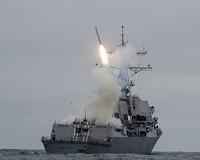| . |  |
. |
Moscow (UPI) Jul 2, 2010 Russia stands to lose billions of dollars in arms and aerospace deals with Tehran if the Kremlin sticks to its guns and refuses to deliver powerful S-300 air-defense missiles under an $800 million deal, the Nezavisimaya Gazeta daily has warned. The Islamic Republic will just turn to China for its weapons systems, thus depriving Moscow of a major source of revenue, the newspaper reported Wednesday. Russia announced it would freeze delivery of five mobile S-300OPMU batteries to Iran after the United Nations Security Council imposed sanctions on the Islamic Republic on June 9 because of Tehran's refusal to abandon its nuclear program. These included harsher financial controls and an expanded arms embargo. This incensed Tehran, which had been complaining for months that Moscow was dragging its feet on delivering the truck-mounted S-300s under a 2007 contract. Russia cited "technical difficulties," but it was under intense pressure from the United States, as well as Israel, not to supply the missiles. Tehran wants them to protect its key nuclear facilities against air attack. At present, the Iranian air-defense system does not have anything remotely like the S-300, which can engage multiple targets, missiles as well as aircraft, at ranges of more than 100 miles at low and high altitudes. Israeli aircraft could penetrate Iran's current defense without too much trouble, although there would be losses. But with S-300s in place it would be immensely more difficult to knock out any nuclear sites and losses would be much higher. Iran's parliament speaker, Ali Larijani, said Thursday during a visit to the Syrian capital of Damascus that the S-300 contract was concluded before the Security Council passed Resolution 1929. "It's an old contract," he said, "therefore it has nothing to do with the resolution. Moreover, it's a defensive weapon." Russia supported Resolution 1929, citing concerns that Iran was seeking to develop nuclear weapons, a charge Tehran has repeatedly denied. Russia is building a nuclear reactor for Iran at Bushehr in the northern Gulf, but is already two years behind the declared completion date. Moscow's participation in that key project could now be in jeopardy. Russia has been a major arms supplier to Iran over the last decade, despite U.S.-led international arms embargoes imposed soon after the 1979 Islamic revolution. Moscow has supplied AT-3 K11 and AT-4 9K111 anti-tank missile systems and 25 Mi-17 and Mi-8 transport helicopters as well as Pantsyr S-1E and Tor M1 short-range air-defense missiles. Russia's state-run arms exporter Rosoboronexport, is currently upgrading Iranian T-72 tanks, Sukhoi Su-24 ground attack jets and MiG-29 interceptors under a $1.5 billion deal. It is not known at this point whether that upgrade program will continue. Russia is also believed to have provided considerable technological support for Iran's ballistic missile program, as have China and North Korea. So that too could now be in jeopardy. China has also been an arms supplier, although not on the scale of Russia. Beijing has sold Iran C-801 and C-802 anti-ship cruise missiles over the years and the Iranians have upgraded these systems, extending their range, and has reportedly sought to develop air-launched versions as well. The Revolutionary Guards' naval wing operates 10 Chinese-built Houdong-class missile craft. China, which has major energy deals with Iran, again in defiance of U.S.-led sanctions, produces versions of Soviet-designed weapons systems that could presumably be easily absorbed by Iranian forces. Beijing is always on the lookout for arms customers. Nezavisimaya Gazeta reported that Russia's immediate financial losses over the S-300 will amount to the $800 million contract plus penalties for breach of contract it estimated at $400 million. "Furthermore, Iran could refuse to buy any more military products from Russia, leading to an estimated loss of $300 million to $500 million," it said. The daily said that "another trend that should be worrying Moscow" is the possibility that Tehran "will effectively end cooperation in the civil aviation sector." State-owned Iran Air has Tupolev and Ilyushin airliners in its fleet. However, last month, in apparent retaliation for the Russia's support of the U.N. sanctions, Iran banned its airlines from using Tupolev Tu-54 jets on domestic and international routes. "In addition," Nezavisimaya Gazeta noted, "there have been reports of the imminent deportation of Russian pilots because the Islamic Republic already has 'enough qualified flight personnel.'"
Share This Article With Planet Earth
Related Links Learn about missile defense at SpaceWar.com All about missiles at SpaceWar.com
 USS Sterett Calls Tomahawk Missile Launch A Success
USS Sterett Calls Tomahawk Missile Launch A SuccessUSS Sterett, At Sea (SPX) Jul 01, 2010 The guided-missile destroyer USS Sterett (DDG 104) successfully launched two Tomahawk missiles during a weeklong weapons training exercise in the Pacific Ocean June 21-25. "The missile launch was a success," said Pablo Dasalla, lead platform test coordinator, who was on board to observe the launch. According to Dasalla, the planning required to launch a Tomahawk missile takes three t ... read more |
|
| The content herein, unless otherwise known to be public domain, are Copyright 1995-2010 - SpaceDaily. AFP and UPI Wire Stories are copyright Agence France-Presse and United Press International. ESA Portal Reports are copyright European Space Agency. All NASA sourced material is public domain. Additional copyrights may apply in whole or part to other bona fide parties. Advertising does not imply endorsement,agreement or approval of any opinions, statements or information provided by SpaceDaily on any Web page published or hosted by SpaceDaily. Privacy Statement |